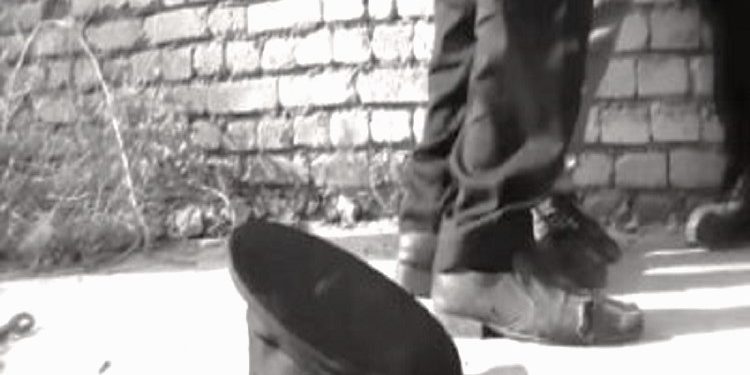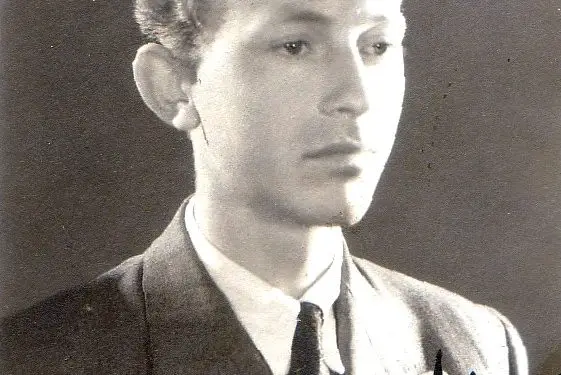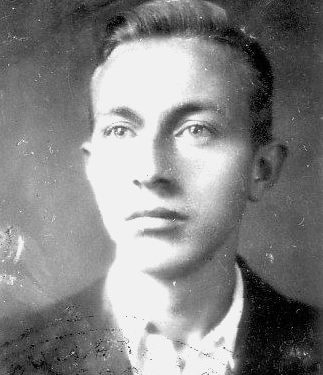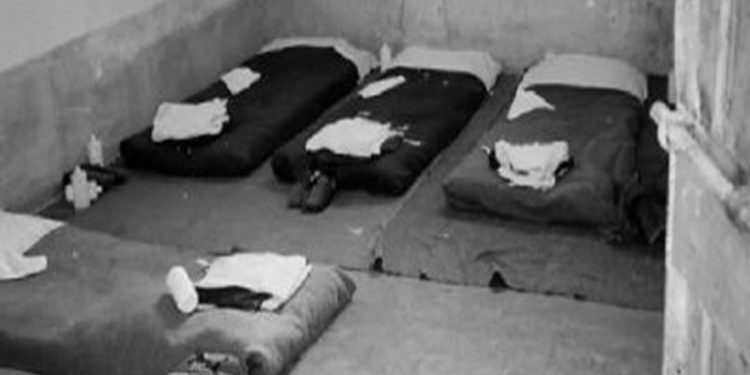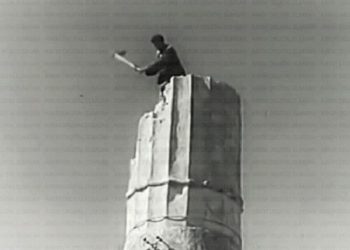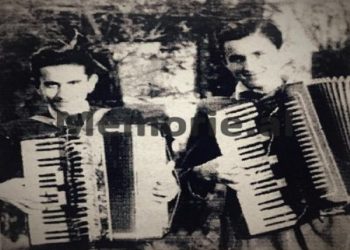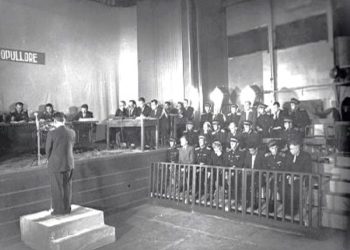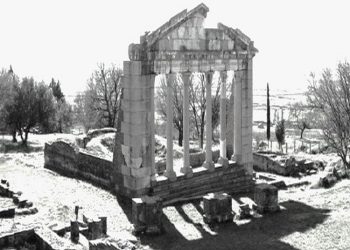By Uran Kalakulla
Part Twenty-Two
Nazism and Communism
Memorie.al / Nazism lasted 12 years, while Stalinism lasted twice as long. In addition to many common characteristics, there are many differences between them. The hypocrisy and demagogy of Stalinism was of a more subtle nature, which was not based on a program that was openly barbaric, like Hitler’s, but on a socialist, progressive, scientific and popular ideology, in the eyes of the workers; an ideology that was like a convenient and comfortable curtain to lie to the working class, to lull the sharpness of intellectuals and rivals in the struggle for power.
One of the consequences of this peculiarity of Stalinism is that the entire Soviet people, its best, capable, hardworking and honest representatives, suffered the most terrible blow. At least 10-15 million Soviets lost their lives in the KGB torture chambers, martyred or executed, as well as in the gulag camps and others like them, camps where it was forbidden to correspond (in fact, they were prototypes of the Nazi death camps); in the mines in the ice of Norilsk and Vorkuta, where people died from cold, hunger, from crushing work in countless construction sites, in the exploitation of forests, in the opening of canals and during transportation in lead-lined wagons, or in the flooded barns of death ships.
Continued from the previous issue
– “So, you and your comrades, you filled your pants with us prisoners”?
– “No, no! It seemed to us that you had horns and were eating human flesh.”
– “Hey, come on!” – I said in his own voice and continued;
– “But now that you are also an ‘enemy of the people’, are you getting horns on your head? Then, do you see that there is some meat in the cauldron, along with human flesh”?
The Kërraba mountaineer was already with us and had not yet lost his fear of us, so he always stayed aside, lest we rush at him and tear him alive, to make him look like a scoundrel! As you can see, we were not only called “enemies of the people,” but they had also given us the nickname “cannibals.”
The murder of the old pigeon farmer
In the Elbasan prison camp, among others, I also met an elderly man who had been in his sixties for years. He was of somewhat below average height, with a sweet and calm face, which reflected kindness. They called him Reshat Ago, from Berat. The very fact that he was from this city, told me something about his human being, about the nature of his speech, his attitude, his psychology, his mentality, because I knew that city well in my youth: with its characteristic appearance, with the ancient and heavy castle, which rose above the city like a guard and at its feet the city’s neighborhoods, with the white, light houses, with many large windows, which from afar resembled a large flock of pigeons, sitting in a cluster, next to each other.
Since I had worked as a teacher in that city, I knew not only the souls of children, but also that of adults, young people, boys and girls, the elderly, old and old. And I noticed with pleasure not only the gentleness and civility of the citizens, the noble respect for the “foreigner”, the cleanliness of the people and the living environment, but also the similarity in behavior and requirements, such as: simplicity, the almost absolute absence of arrogance and conceit, the sweetness and beauty in behavior and even in language. And I felt a special love for that city, truly built on foundations of rock and stone, but which rose towards the blue of the sky, like that white lily, which, although it has grown at the foot of the rock, in the semi-shade, tries to raise high in search of the sun’s rays, of the fresh air. Without wanting to take sides at all, but when I compared Berat with Gjirokastra, the city of my father, the land of my ancestors, I saw a fundamental difference.
Well, both cities with foundations on rock, but while Berat rose towards the heights, like a dove’s wing, Gjirokastra, rising up, takes with it the stone foundations, from the bottom to the top, on the roofs of the houses and, as you walk through its alleys, the sound of your step has the echo of the beating of iron; the desired whiteness is broken by the persistent gray of the granite; the Gjirokastra song has the strict tonality of the Labëria mountains; the city’s language is sharp, like the blade of a knife; the Gjirokastra spirit has the yeast of defiance, the sharpness of satire, the sting of ridicule, to the uncleanliness of old women and women, who leave no one untroubled, no flaw unridiculed, newborn love gossiped about, neighborhood gossip unblown, to the point of urban legend. Thus, the old man Reshat Ago, with whom I often stayed, seemed to bring me longing for his city and my lyrical memories from that city.
Reshat had been a teacher until he retired. He even had a wife who was a teacher. But, as a teacher, he had not sold his soul to the devil at all, to become a loyal servant of the communist regime. And he had worked honestly, truly stoic and silent, but preserving in his soul, as something secret, the resentment towards the rulers and the capricious and violent party members, who had long since betrayed the honesty of the civic spirit of Berat. Reshat Agoja was a great patriot. He had the foundations of his soul in the civic monument of Baba Dudë Karbunara. And he preferred the verses of Nezim Berati and, why not, those of Hasan Zyko Kamberi.
Reshat did not have any extensive cultural education. He had remained at the level of a simple elementary school teacher, without ambitious goals to climb higher. But he had done his work with great devotion, with unwavering care and love, like that gardener who takes more care of young seedlings, so that they too can grow as tall as other plants. Because he loved his children very much, his tiny, young students.
And, apparently, from this care and love, sculpted throughout his life as a teacher, he had suffered a great impact on his very being, so he had already become old, almost with a child’s soul. And just as a young child sees the national flag waving in the air and worships it as something sacred, as something divine, so did their teacher Reshat Ago see and worship this flag.
There was no ideological complex in his mind that was not fundamentally Albanian. He did not want foreign bread, but Albanian misroka. He did not want to know about political divisions, because he wanted the whole, undivided, Homeland. His party was only Albania, like the Frashëri brothers, like Gjergj Fishta, like Ndre Mjeda, like Baba Dudë Karbunara. Thus, Reshati did not like to talk at all, neither about “Ball” nor about Legality, when he saw some around him, who from time to time quarreled among themselves, even where they were, about who made the egg the chicken or the chicken the egg …! He did not hate anyone, any kind of foreign worldview. He worshiped God and Albania. And the prophet of Albanianism, he called Skanderbeg. He did not want to hear the names of either the Greek or the Serb, whose atrocities, he said, made him sick.
It seems that the Bektashi who was, a follower of their tekkes, he followed foot by foot, both Naimi’s “Livestock and Agriculture”, and his “Karbela”, and Imam Hasan and Imam Hyseni, these martyrs of the Karbela field, he called victims of the lowly of Yazid. And for Reshat, Yazid and his army was Enver Hixha and whoever put them after him. It is likely that some such word had slipped from his mouth to someone. And the Yazid hafiyyah, had taken him fresh to Yazid with ranks and the other Yazids with stars on the top of their hats, had put him in handcuffs, as an “enemy of the people” and had thrown him in prison for ten years, for agitation and propaganda.
I have never seen anyone come to the door of the prison camp to meet him or to bring him anything. Neither his wife nor his children. It was said that his wife had divorced him by court order, of course forced, in order to keep her job and raise her children. And this had completely crushed poor Reshat spiritually. It was dripping into his heart, especially for his children. He had loved his children, his students, with all his heart. But how much could he have loved his own? Thus, the poison of despair was burning his heart more and more every day.
So he usually stayed alone, in a corner of the prison camp yard, and took care of the command pigeons, which cooed in the shelter of a silo roof. I don’t know if anyone sent him any money by mail, like some of us, but I had seen that he crushed almost half of his bread ration and distributed it to the pigeons. I dared to say to him one day:
– “Uncle Reshat, why do you throw bread to the command pigeons and fatten them? Don’t you know that, when they get fat enough, they will go to the command officers’ chef’s knife”? He raised his head and looked at me with a half-hearted look, surprised. Surprised, of course, not at me, but at the butchers of the command kitchen and surprised at the fate that awaited the pigeons, which he called his own. And, after being silent for a while, he said to me:
– “The children have abandoned me. Here, instead of children, I have these pigeons”. One day I saw him distributing a candy to those he met. He approached me and offered me one too.
– “What happened, Uncle Reshat? Any good news? Ishalla”!
He smiled and replied:
– “One of these days, I will be released from prison”.
– “How? An apology from the government”?!
– “No, no,” he said, “what apology from the government”?!
– “Yes, then”?!
– “An apology not from the government, my friend, but from God”!
I didn’t quite understand what the poor old man was talking about and my mind wandered to some kind of mishap. I had noticed that recently, he had withdrawn more tightly into himself and his words had become much rarer. From time to time, I had caught him raising his eyes to the sky and muttering something under his breath, without being able to hear or understand anything. And it occurred to me that he was praying to God.
One of those days, when we returned from work, the whistle sounded again to get in line. We all felt that with annoyance. We were tired, hungry, and we wanted to do our usual chores and curl up in our beds to get some rest. But they wouldn’t let us. They counted us once, twice, three times, and finally it turned out that one of our men was missing. We didn’t know who it was. Was it a new escape? Blessed is the one who managed to escape! The trouble was ours. They would start again with truncheons and hoe. For the smallest thing.
Or without doing anything at all. But while we were talking to each other, in groups, a machine-gun volley was heard, not far from us. Then we realized that something serious had really happened, a bloody incident. The volley was not repeated again, but we noticed that from the command, the command officers, the captains and those who were not, poured towards the work object. The siege of the work facility was not lifted until our exact count was known. That was how it happened that day. And, as we later learned, the murdered man was old Reshat Ago. We also learned the details.
When all the imprisoned workers were brought into the place of residence, certainly well surrounded and secured, only then was the great siege of the work facility lifted, that is, when their exact count was known, like that of sheep returning from the pasture and locked in the pen to spend the night. This, of course, was known very well by poor Reshat Agoja. But he had remained hidden until all the convicts had fled (probably so that they would not see his murder), he had tried to break through the siege and the barrage had left him in place. Well, even the most ordinary policeman could have caught that poor old man by the hand, so that he would not be killed. But the spirit-being of the guards and the command, committed the murder. Thus, another lost grave was added to the countless number, in that place of horror.
In the prison camp of Fushë-Krujë
From there, in May 1966, the Elbasan prison camp was transferred to the one in Fushë-Krujë, where a large cement factory was being built, like the one we were building in Elbasan. There we found about a hundred regulars, after the others had removed them. They were also removing them little by little. It seems that the Ministry sent us, the “enemies”, to finish what the regulars had started, as if we were more specialists than them. In fact, there were more specialists in our staff, from construction masters, standard-setters, technicians and engineers. And it seems that we did a job that was both more qualified and faster.
That prison camp seemed to us to be a mess and did not have the order that we had both in the organization of work, in the construction of the camp itself, in the internal organization, in discipline, in the silos, which here were like some ugly huts, if not worse. But, perhaps this made us feel a little freer. But, what impressed us was that, when we went, the orderlies seemed to shrink. Why? Weren’t we also like those prisoners, forced labor slaves?
We noticed that they looked at us with fear, as if with suspicion and, at first, as if they did not approach us. It was clear that, in addition to fear of us, they also felt a certain respect. “The politicians have come” – they would say, with a clear sense of inferiority towards us and, when they began to approach, I noticed a kind of respect in their behavior towards us. To have respect and I understood, even though some of “ours” were worse than them, just because they were called “politicians”!
In fact, it was the latter that approached the newly found more quickly and easily. It was clear: animals of the same species approach each other quickly. Were they afraid? Why? Were we not the same as them in appearance, in lifestyle, in that eternal boredom that had taken over all of us? By uncovering this phenomenon, I finally learned the secret of this from them themselves. The designation: “enemy of the people”, terrified them. But what were they? Could it be “friends of the people”?
Why could they be the saviors, the spiritual leaders of the people in a possible and expected future, when the communist regime had collapsed and freedom and democracy would come to our unfortunate and long-suffering country? “Friends of the people” to kill, steal, deceive, dishonor? Later I also learned that, before we arrived there, the camp command (commandant, commissar, operative, and even the captains), had spoken very badly about us and had set the date.
They had been told, for example, that we were savages, that we drank human blood, that we were very evil, criminals, murderers, that we were the most sworn and dangerous enemies of the Party and the “People’s Power”; that if the Anglo-Americans came, we would all be the first to be shot; that they, on the contrary, were still the sons of the Party and the power; and that, in the event of war, “imperialist aggression” against our country, the “ordinary comrades” would not only be immediately released from prison, but would be dressed as soldiers, given weapons, and, before shooting at the soldiers of the external enemy, they would shoot at us, the “heads of internal enemies” and a thousand and one black people.
In truth, this propaganda against them was not a farce. There was a historical truth in Stalinism in it. During the War, Stalin had killed and completely destroyed several camps of political prisoners. It was even said that he had machine-gunned them with Soviet aircraft, disguised as German aircraft, to make the lie credible, that it was the Nazis who had done such a thing, and not the Soviet KGB itself, with Stalin at the helm. What a dirty and vile criminal cruelty?!
But, do not be surprised at all by this discovery of ours. Why, hadn’t they said openly several times, in prisons and forced labor camps, in their “re-education” conferences, that we should not pray for the Anglo-Americans to come, that the first to be exterminated would be us? So, when they came, they would be the first to step on our corpses. Therefore, on the contrary, let us pray that the “People’s Power” would last as long as the mountains, and even longer, until the end of the world.
What beautiful re-education conferences they were for us! They were not farces, on the contrary, they were a very expected reality, and they were in the plans of the communists. Why, when the Americans liberated most of North Korea, didn’t they find the camps of North Korean political prisoners, riddled with bullets? Among the orderlies, I saw in that camp also an old acquaintance of mine, the “former writer” and former director of the Puppet Theater, Selman Vaqarri, convicted of pederasty, but I don’t know how many years.
Selman had other “formers”: the former “general of pioneers”, who on holidays would parade on horseback at the head of a column of children, with a red scarf around his neck and a hat with a red star on his forehead. That Selmani was also the “ideatrix, organizer and leader” of DEBATIK, the “political and militant” formation of the Kalamaj, against fascism. But he was also one of the first among the young communists of the Tirana high school, a despot and persecutor of his schoolmates, directly linked to the Sigurimi.
It was he, besides others, who had organized the beating of the high school students, when they discussed that they did not see the “People’s Power” in a good light, that they were a contingent of the “overturned classes”, that is, bourgeois and pro-Western. It was he, together with a certain Janaq Toka, who organized the beating of me and two of my friends in the high school yard, causing me to stay in bed for two weeks, on July 26, 1947, at the meeting held to announce the departure of high school students as “volunteers” to the “Durrës-Rogozhinë” railway. Now I had him there, before my eyes, convicted of “slapping” a child. I don’t know how true such an accusation was, but it was precisely for such an accusation that his own party had convicted him! Memorie.al




